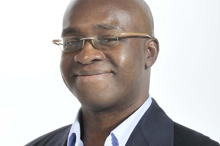Empowering People Worldwide to Fight Counterfeit Drugs

Ashifi Gogo is being honored as a Champion of Change for his accomplishments as an immigrant entrepreneur and innovator.
When you think about counterfeit products, what do you imagine? Do you envision fake Prada bags hanging in an open-air market, or poorly duplicated DVD knock-offs on a makeshift table in New York City? How about potentially harmful or fatal counterfeit drugs sold in pharmacies and on makeshift street carts? Many emerging markets, like my home country Ghana, face the latter issue every single day.
If you don a fake bag, you likely won’t get hurt or die from it, but consuming fake medication is a whole different story. Counterfeiters don’t abide by any quality standards, so taking a fake drug could mean consuming something made out of relatively harmless ingredients like starch or chalk—or worse, harmful ingredients like anti-freeze, heavy metals and brick dust. In both cases, the active ingredient could be in wrong doses or could not be present at all, rendering the drug purchased with hard-earned money essentially useless. With over 700,000 people dying every year from fake tuberculosis and antimalarial drugs alone—the equivalent of five fully packed jumbo jets crashing every day—the threat of counterfeit medicine is all too real.
Meanwhile, mobile technology in emerging markets is booming. Mobile phone subscriptions globally jumped from under one billion in 2000 to over six billion in 2012—five billion of which are in emerging markets. How could we take this positive trend and use it to address a serious global problem like drug counterfeiting?
While pursuing my Engineering Ph.D. at Dartmouth College, I developed technology that answered that question. Mobile Product Authentication allows consumers to use their mobile phone to verify that the products they are buying are the real deal. The solution is simple: before purchasing a product, a consumer will scratch off a part of a security label that will reveal a unique, one time use PIN that is texted to us for free. The consumer will then receive a reply stating that the product is genuine, fake, or even stolen.
In 2010, we piloted the solution in Nigeria with Merck KGaA’s in-market representative using the diabetes treatment drug Glucophage. The pilot was such a success that we have since expanded our operations to five countries across three continents. We now protect products across various industries, including automotive, electrical goods, and textiles and clothing.
By empowering people to fight for their basic right to be safe from dangerous products like fake medicine, we can help foster positive change in the world. We can see statistics on unnecessary deaths from counterfeit products dwindle, ideally to zero.
I often think about how we took a positive trend in mobile technology and used it to develop a solution that saves lives, and I reflect on how we could apply that logic to address issues in our community and in our world. What positive trends do you see around you? How can you use those trends as fuel to give back to your community, to your country, to the world? How can you take an everyday object like a mobile phone and turn it into a weapon of mass construction? Sometimes the solution to problems is as simple as reaching into your pocket.
Ashifi Gogo is CEO of Sproxil, Inc.
White House Blogs
- The White House Blog
- Middle Class Task Force
- Council of Economic Advisers
- Council on Environmental Quality
- Council on Women and Girls
- Office of Intergovernmental Affairs
- Office of Management and Budget
- Office of Public Engagement
- Office of Science & Tech Policy
- Office of Urban Affairs
- Open Government
- Faith and Neighborhood Partnerships
- Social Innovation and Civic Participation
- US Trade Representative
- Office National Drug Control Policy
categories
- AIDS Policy
- Alaska
- Blueprint for an America Built to Last
- Budget
- Civil Rights
- Defense
- Disabilities
- Economy
- Education
- Energy and Environment
- Equal Pay
- Ethics
- Faith Based
- Fiscal Responsibility
- Foreign Policy
- Grab Bag
- Health Care
- Homeland Security
- Immigration
- Innovation Fellows
- Inside the White House
- Middle Class Security
- Open Government
- Poverty
- Rural
- Seniors and Social Security
- Service
- Social Innovation
- State of the Union
- Taxes
- Technology
- Urban Policy
- Veterans
- Violence Prevention
- White House Internships
- Women
- Working Families
- Additional Issues

